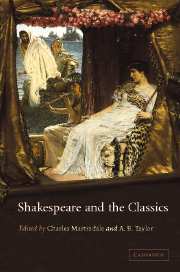Book contents
1 - Shakespeare and humanistic culture
Published online by Cambridge University Press: 22 September 2009
Summary
No one knows exactly how and when Shakespeare read ‘the classics’, or even what he might have thought they were. Indeed it may be slightly misleading to talk about ‘the classics’ in relation to Shakespeare at all. The word is not recorded before the eighteenth century in the sense ‘A writer, or a literary work, of the first rank and of acknowledged excellence; esp. (as originally used) in Greek or Latin’ (OED B.1), and Shakespeare does not use any form of the word ‘classic’ or ‘classical’ at any point in his career. It's highly unlikely that he had a rigid or restricted sense of a fixed canon of texts which he regarded as the ultimate literary authorities. There was for him much weaker an imaginary boundary than there is now between the Augustan ‘classics’ – Virgil, Horace, and Ovid – and a larger sphere of reading which encompassed, probably in a hodge-podge of languages and surrounded by a variety of levels of commentary, Plutarch, Greek prose romance, a sprinkling of Lucan, the distiches of Cato, a dash of Homer, and perhaps some of Philostratus' Imagines, some of Aphthonius' dialogues, a little Livy, some Cicero, a bit of Quintilian, all of which would be tumbled together with quotations from classical authors which were used to illustrate grammatical points in Lily's Grammar or in Erasmus' educational works. Shakespeare read, remembered, misremembered and hybridised the works which we call ‘the classics’.
- Type
- Chapter
- Information
- Shakespeare and the Classics , pp. 9 - 28Publisher: Cambridge University PressPrint publication year: 2004
- 13
- Cited by



